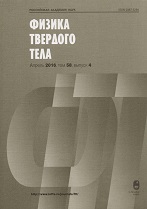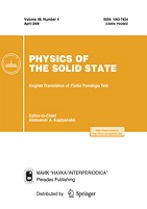|
This article is cited in 12 scientific papers (total in 12 papers)
Semiconductors
Effect of synthesis conditions on the structural, photocatalic, and self-cleaning properties of TiO$_{2}$ nanoparticles
M. Rahmati Ali Abada, S. Farjami Shayesteha, H. Farjami Shayestehb
a Nanostructures Lab, Department of Physics, University of Guilan,
Rasht, Iran
b Departement of Biology, University of Guilan,
Rasht, Iran
Abstract:
TiO$_{2}$ nanoparticles were synthesized via the hydrothermal method. As-synthesized TiO$_{2}$ properties were characterized by XRD, EDX, FESEM, FTIR, and UV-Vis spectroscopy. Indicated peaks in XRD patterns confirm formation of TiO$_{2}$ nanoparticles with the anatase phase. Average crystallite sizes and strain were estimated from the XRD main peaks of all samples through Williamson–Hall method. Optical energy band gap of TiO$_{2}$ was determined to be about 3.27–3.44 eV, which appeared higher than those of other researches for anatase TiO$_{2}$ (3.20 eV). Also, increasing temperatures and aging times make the crystallite size increase and the energy band gap decrease. Photocatalytic activity of samples was examined by measuring rate of methylene blue (MB) decomposition. In photocatalytic process, MB was degraded by photocatalytic and adsorption processes. Aging temperature and time were significant in terms of the MB decolorization ability. The optimal synthesis condition of temperature and aging time was obtained at about 130$^\circ$C and 16 h, respectively. TiO$_{2}$ nanopowder prepared in the previous step was deposited by the spin-coating method on a glass substrate. Self-cleaning properties of the glass substrate coated with TiO$_{2}$ nanoparticles were studied by measuring the water contact angle. TiO$_{2}$ thin films have little photocatalytic activity because of their low area. To overcome this disadvantage, TiO$_{2}$ porous thin films were deposited on glass substrates using polyethylene glycol (PEG) as a template pore- generating agent. TiO$_{2}$ thin film with 20 wt.% PEG showed better hydrophilic property and a better self-cleaning property. Enhancement of surface wettability due to UV-induced TiO$_{2}$ hydrophilicity has been evidenced by contact angle measurements. Keywords: anatase TiO$_2$ nanoparticles, photocatalytic, self-cleaning, contact angle, polyethylene glycol.
Keywords:
anatase TiO$_{2}$ nanoparticles, photocatalytic, self-cleaning, contact angle, polyethylene glycol.
Received: 13.08.2019
Citation:
M. Rahmati Ali Abad, S. Farjami Shayesteh, H. Farjami Shayesteh, “Effect of synthesis conditions on the structural, photocatalic, and self-cleaning properties of TiO$_{2}$ nanoparticles”, Fizika Tverdogo Tela, 62:1 (2020), 92; Phys. Solid State, 62:1 (2020), 120–130
Linking options:
https://www.mathnet.ru/eng/ftt8526 https://www.mathnet.ru/eng/ftt/v62/i1/p92
|


| Statistics & downloads: |
| Abstract page: | 117 | | Full-text PDF : | 39 |
|





 Contact us:
Contact us: Terms of Use
Terms of Use
 Registration to the website
Registration to the website Logotypes
Logotypes








 Citation in format
Citation in format 
